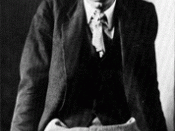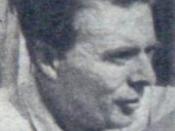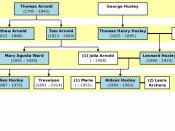Aldous Huxley, in his distopian novel,- Brave New World , written in 1932 presents a
horrifying view of a possible future in which society has become a prisoner of the very
technology it hoped would save us. In -Brave New World Huxley's distortion of
technology, religion, and family values, is much more effective than his use of literary
realism found in his depiction of a savage reservation. Through his use of distortion
Huxley tells a classic tale with the theme of, be careful what you wish for, because it may
not truly be what you wanted.
Huxley effectively uses distortion in -Brave New World through his depiction of
social values of the future. For example, when Barnard Marx hears somebody talking
about Lenina in the locker room, he becomes upset. Leaving the building, everyone he
passes recommends soma for his bad mood. Huxley shows the reader that drug use is
becoming more and more an acceptable way out for a weak society.
He is showing
society that we are becoming emotionally incapable of dealing with pain and hurt.
Furthermore, the students, while speaking with the director of the London Hatchery, are
told at one time people were viviparous, and were disgusted and outraged. Huxley is
trying to warn society that its lack of commitment and endurance will eventually be its
downfall. Lack of the experience of pregnancy severs the emotional ties of the woman
and her child. An emotionless society feels no guilt. In addition, Lenina, when accused
of lack of promiscuity by Fanny while in the locker room, religiously denies it.
Monogamy requires commitment, pain, and work. Huxley is predicting humans
progressing to a society of people who are unable to focus on anything but pleasure;
unable to handle the work of a commitment. He knew the road...


